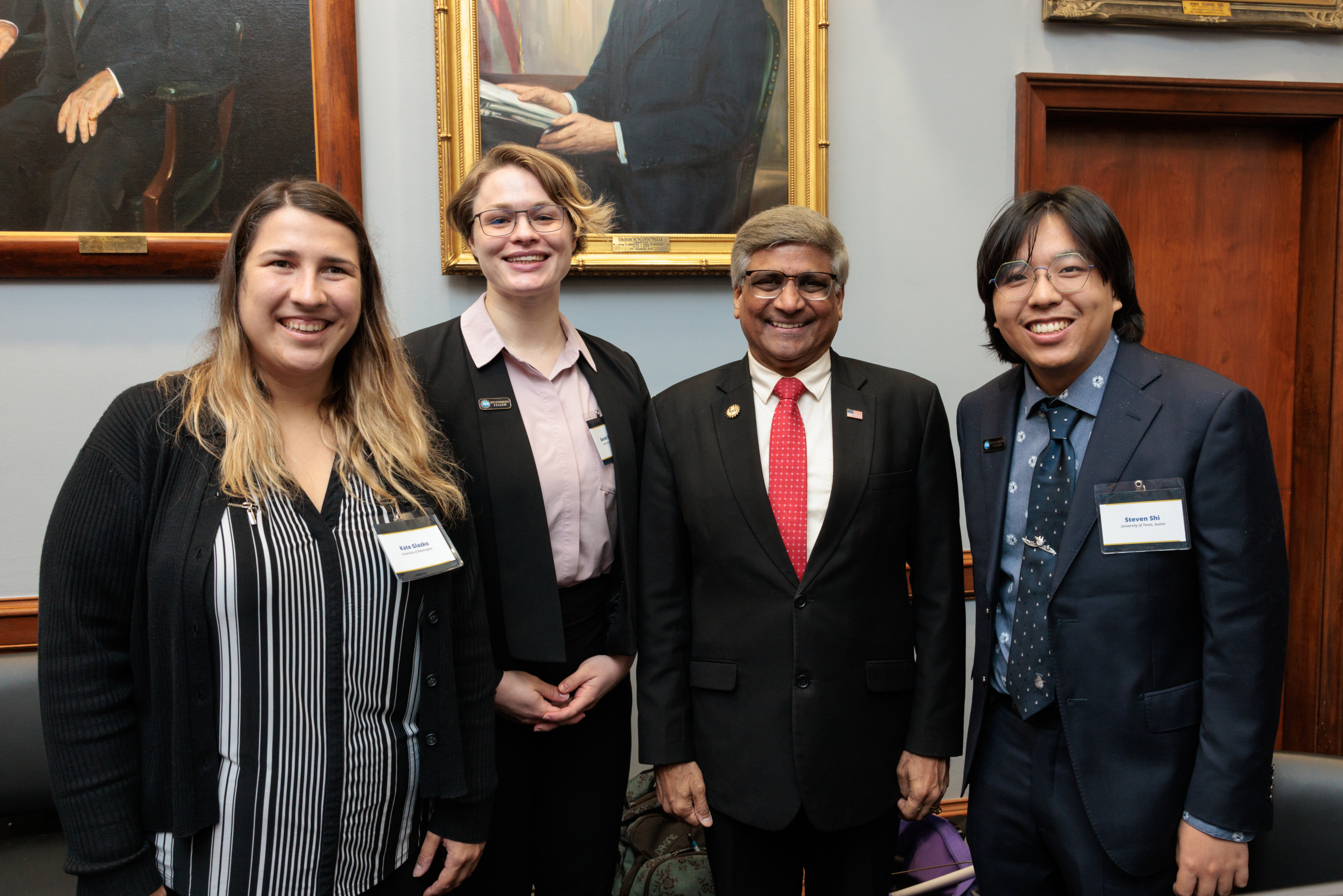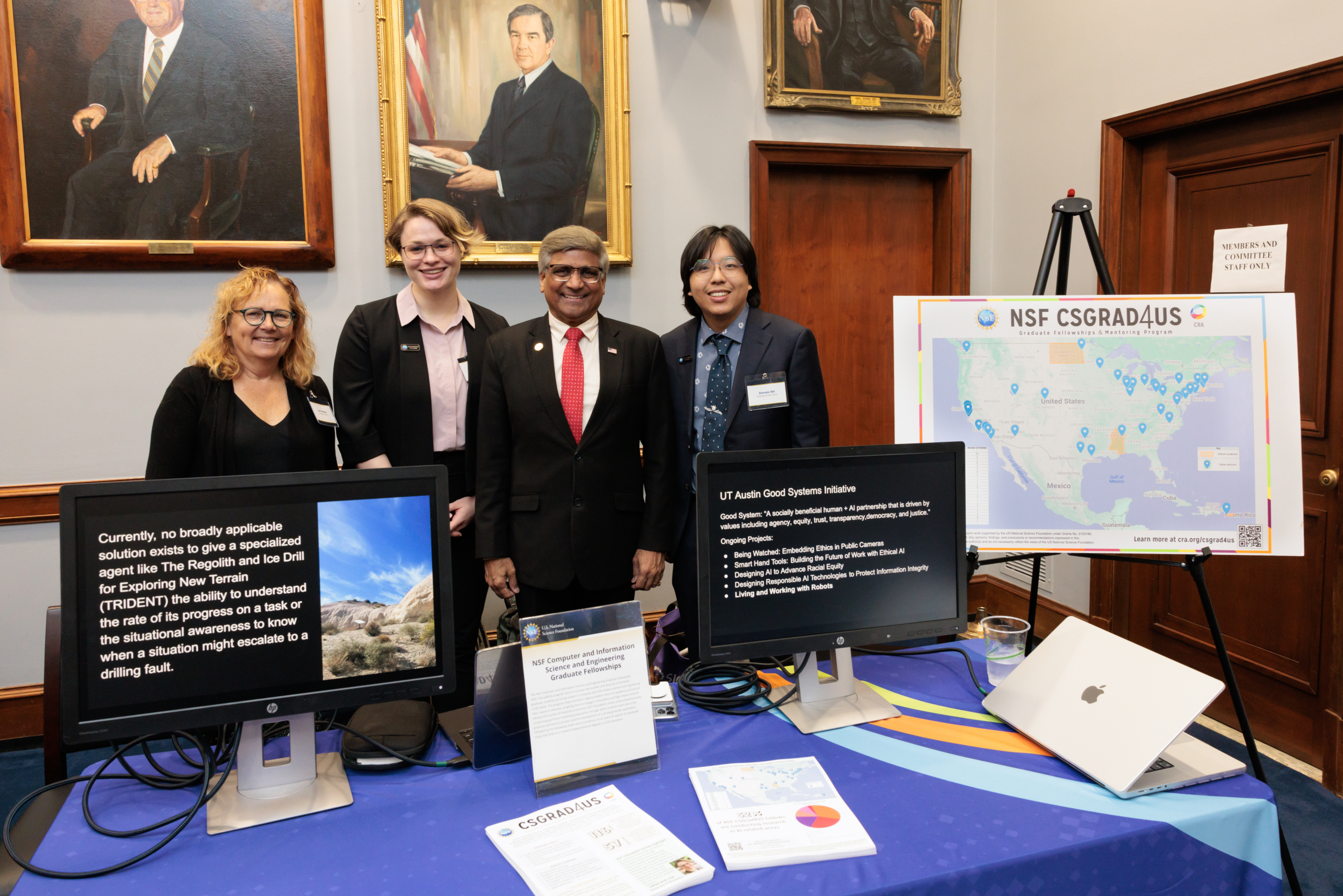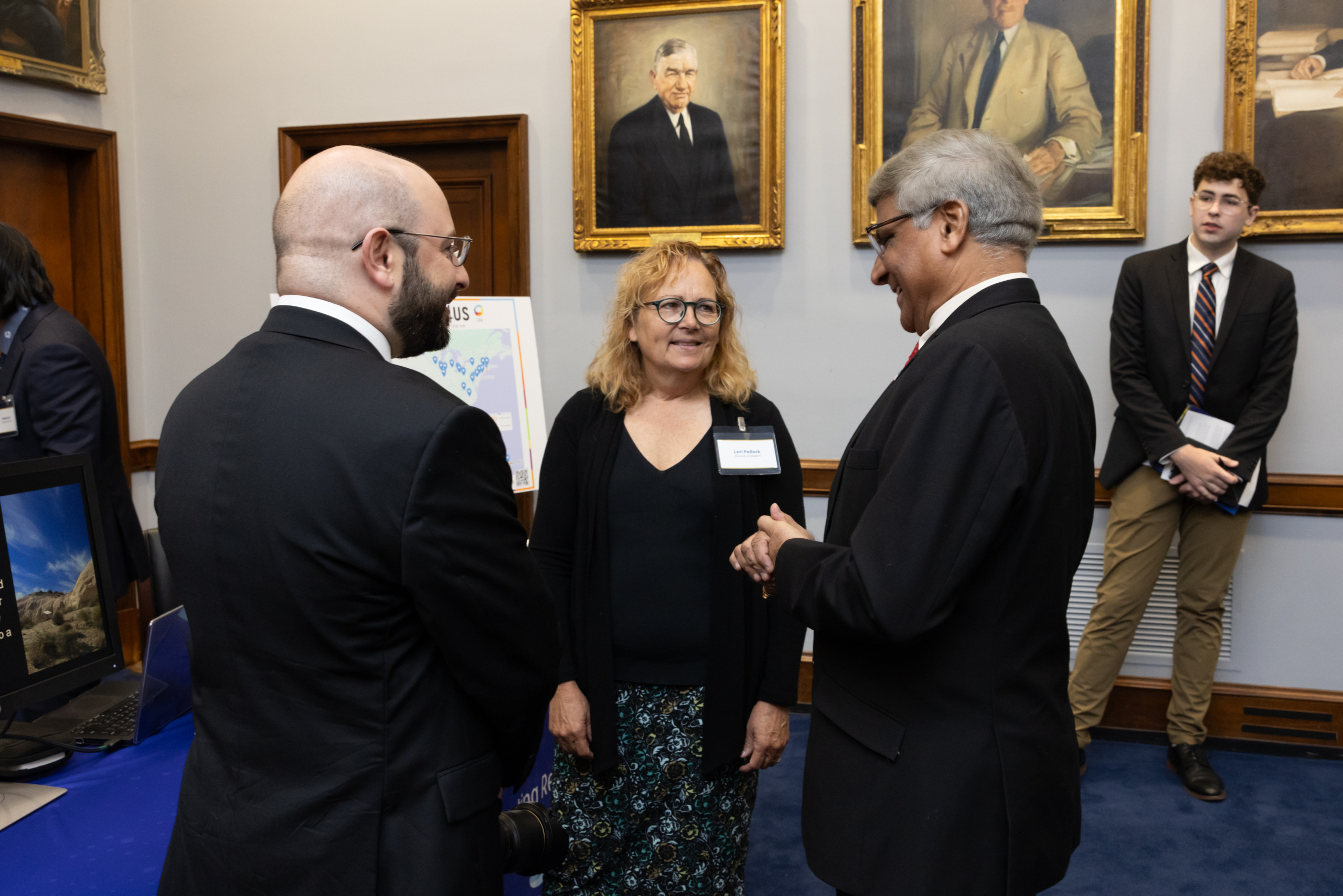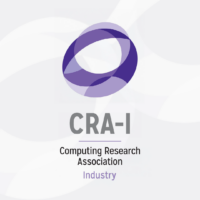CRA Update: NSF CSGrad4US Fellowship Program Shines at AI Education Showcase on Capitol Hill
By Matt Hazenbush, Director of Communications
Last month, the U.S. National Science Foundation (NSF) CSGrad4US Fellowship and Mentoring Program, administered by the Computing Research Association (CRA), took center stage at the “Empowering the AI Talent of Today and Tomorrow: NSF Investments in AI Education and Development” event, held at the Rayburn House Office Building on Capitol Hill. Co-hosted by the House and Senate AI Caucuses, the Congressional Showcase highlighted the essential role of AI education in preparing the next-generation workforce.
CRA and community members play a pivotal role in supporting the NSF CSGrad4US Fellowship Program, providing administrative support and mentorship to guide Fellows through their transition into PhD programs. This partnership has allowed the program to thrive, helping bachelor’s degree holders return to academia and contribute to the growing field of computing research, particularly in artificial intelligence.
The event featured remarks from Members of Congress, including Representatives Anna Eshoo (CA-16), Maxwell Frost Amo (FL-10), and Henry Cuellar (TX-28), as well as opening remarks from NSF Director Dr. Sethuraman Panchanathan. Dr. Panchanathan emphasized the critical role NSF plays in shaping a future-ready AI workforce, ensuring that every state and community has the tools and resources to lead in AI innovation.
The event showcased 14 NSF-funded projects, underscoring the importance of federal investments in AI education and workforce development. The NSF CSGrad4US Fellowship Program, with 52 percent of its Fellows conducting research in AI-related areas, was a key part of this conversation, demonstrating its impact in driving innovation and meeting the growing demand for AI expertise.
NSF CSGrad4US: Preparing a Diverse AI Workforce
The NSF CSGrad4US Fellowship Program is designed to increase the number of diverse, domestic graduate students pursuing careers in research and innovation. Specifically aimed at individuals with bachelor’s degrees who are currently working in industry, the program helps them return to academia to pursue PhDs in computer and information science and engineering (CISE) fields. The program provides personalized coaching, feedback on application materials, and strategies for thriving in graduate school, along with financial support for graduate school application fees.
Fellows receive significant financial support, including a $37,000 annual stipend for three years, a $16,000 annual cost-of-education allowance for tuition and fees, and travel funds to present research at technical conferences. In addition to financial assistance, the program offers mentorship and guidance, while fostering a sense of community among Fellows, helping them build professional networks with other Fellows and faculty advisors.
Sarah Boelter, a Fellow from the University of Minnesota who attended the event, shared her experience with the program:
“As someone coming from an industry-focused background, the NSF CSGrad4US Fellowship & Mentoring Program helped me develop realistic expectations for graduate school. The Fellowship gave me the opportunity to leverage the skills I developed over the course of my career and empowered me to bring new ideas and perspectives into the world of academic research.”
Steven Shi, a Fellow from The University of Texas at Austin, also shared his journey:
“I had always wanted to pursue a PhD in the AI/ML field but had financial obligations to meet after graduating. Wanting to return to academia years later, I found it difficult to be a competitive applicant particularly due to my lack of research experience. Receiving the CSGrad4US Fellowship not only provided funding for my PhD, it also meant having a dedicated mentor during the application process to help tailor my statements to what admissions committees were looking for and befriending a rich network of Fellows who were transitioning from a similar stage in life as me back into academia.”
These experiences underscore the unique value of the program in helping professionals transition from industry to academia, bringing their diverse expertise into high-impact research areas, including artificial intelligence.
Also in attendance representing the program and CRA was Fellow Kate Glazko, PhD student at the University of Washington; NSF CSGrad4US Program Chair Lori Pollock, Alumni Distinguished Professor in the Department of Computer and Information Science at the University of Delaware; and Brian Mosley, CRA Associate Director of Government Affairs.
Engaging Policymakers on AI Workforce Development
The Capitol Hill event provided an opportunity for NSF-funded teams, including the NSF CSGrad4US Fellowship Program, to engage directly with Congressional stakeholders. The discussions focused on how federal investments are critical in preparing the next generation of researchers and professionals, particularly in the fast-evolving field of artificial intelligence.
Representatives from the NSF CSGrad4US program emphasized the importance of personalized mentoring in ensuring Fellows are well-prepared for the challenges of PhD study and equipped to contribute to cutting-edge AI research. With the majority of its Fellows conducting research in AI-related areas, the program is a key contributor to building a diverse and capable AI workforce.
The Role of NSF CSGrad4US in Shaping the Future of AI
As the demand for AI professionals continues to grow, programs like NSF CSGrad4US are essential in broadening participation in AI education and research. By supporting individuals from diverse backgrounds, the program ensures that a wide range of voices and perspectives contribute to the development of AI technologies that will shape the future of industries such as healthcare, national defense, and beyond.
The Capitol Hill showcase underscored the critical role of federal support in fostering innovation in AI education. With the continued backing of policymakers and the NSF, the NSF CSGrad4US Fellowship and Mentoring Program is poised to make significant contributions to the development of the next generation of AI researchers and professionals.
Get Involved with NSF CSGrad4US
For more information about the NSF CSGrad4US program, visit cra.org/csgrad4us. Interested in applying, or know someone who might be? Sign up to receive notifications when applications for the next cohort open.
Are you a faculty member interested in mentoring an NSF CSGrad4US Fellow? This year’s cohort is actively exploring research opportunities and preparing their PhD applications. To share your research and lab opportunities with these prospective Fellows, submit your details via this submission form, and it will be made available to them as they consider their PhD paths.












